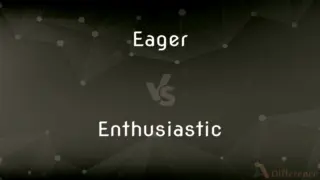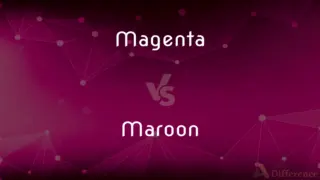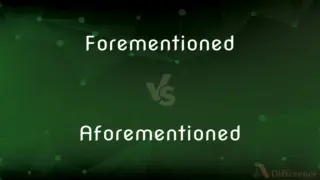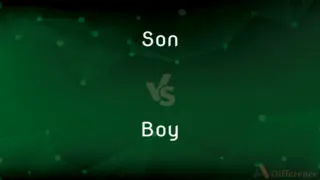Outright vs. Downright — What's the Difference?
By Tayyaba Rehman & Fiza Rafique — Updated on March 9, 2024
"Outright" means completely or immediately, often referring to something that is done or happens in a total and direct way. "Downright" is used to emphasize the negative qualities of something, meaning absolutely or thoroughly in a negative sense.

Difference Between Outright and Downright
Table of Contents
ADVERTISEMENT
Key Differences
Outright" is often used to describe actions or events that are clear and unambiguous, without any hesitation or doubt. It implies something that is done wholly, completely, or to the fullest extent. On the other hand, "downright" is a term used to intensify the description of something, usually with a negative connotation. It emphasizes the degree to which something is bad, unpleasant, or unacceptable.
While "outright" can refer to the manner in which something is done, indicating immediacy or directness, such as in an "outright rejection," "downright" is more about qualifying or intensifying the extent or nature of a characteristic, often in a negative way. "Downright" doesn't imply immediacy or completeness but rather an extreme level of whatever is being discussed.
"Outright" can also imply a sense of finality or decisiveness, such as in an "outright victory," where there is no question about the outcome. "Downright," however, is used to highlight the extreme nature of a situation or characteristic, without necessarily implying a conclusion or outcome, as in "downright ridiculous."
In some contexts, "outright" can denote honesty or frankness, as in speaking "outright," where someone is being direct and straightforward. "Downright," in contrast, does not have this association and is focused on amplifying the negative aspects of the subject it describes.
Both "outright" and "downright" serve as modifiers to strengthen the meaning of the words they accompany, but "outright" leans more towards completeness and immediacy, while "downright" is about intensifying the negative degree or extent of something.
ADVERTISEMENT
Comparison Chart
Meaning
Completely, totally, immediately
Absolutely, thoroughly (with negative connotation)
Usage
Describes actions or events in a direct, complete way
Emphasizes negative qualities to an extreme degree
Connotation
Can be neutral or positive, implying completeness
Generally negative, intensifying unpleasant aspects
Examples
Outright ban, outright victory
Downright offensive, downright ridiculous
Associated with
Finality, decisiveness, directness
Extremity, negativity, emphasis
Compare with Definitions
Outright
Complete and total.
The proposal was met with outright rejection.
Downright
To an extreme degree, especially regarding negative aspects.
The conditions were downright inhumane.
Outright
Without any reservation or hesitation.
He won the competition outright.
Downright
Used to emphasize the severity or negativity.
The mistake was downright embarrassing.
Outright
Immediately, without delay.
The rumor was outright denied by the officials.
Downright
Extremely, unquestionably bad or negative.
The weather today is downright miserable.
Outright
Without any qualifications or conditions.
They demanded an outright apology.
Downright
Absolutely, completely, in a negative sense.
His behavior was downright rude.
Outright
In a straightforward manner.
She expressed her opinions outright.
Downright
Thoroughly, totally, with a negative connotation.
It's downright impossible to work under these conditions.
Outright
Outright is an accounting and bookkeeping application that assists small businesses and sole proprietors with managing their business income and expenses.
Downright
Thoroughgoing; unequivocal
A downright lie.
Outright
Without reservation or qualification; openly
Finally responded outright to the question.
Downright
Forthright; candid.
Outright
Completely and entirely; wholly
Denied the charges outright.
Downright
Thoroughly; absolutely.
Outright
Without additional payments owing, constraints, or stipulations
Owns the property outright.
Downright
(obsolete) Directed vertically; coming straight down.
Outright
Presented without reservation; unqualified
An outright gift.
Downright
Directly to the point; plain
Outright
Complete; total
Outright victory.
Downright
Using plain direct language; accustomed to express opinions directly and bluntly; blunt.
Outright
Thoroughgoing; out-and-out
Outright viciousness.
An outright coward.
Downright
Complete; absolute
Outright
Made without constraints, stipulations, or additional payments owed
Outright sale of the property.
Downright
Really; actually; quite
He wasn’t just cool to me, he was downright rude.
Outright
Wholly, completely and entirely.
I refute those allegations outright.
Downright
(obsolete) Straight down; perpendicularly.
Outright
Openly and without reservation.
I have just responded outright to that question.
Downright
(obsolete) Plainly, unambiguously; directly.
Outright
At once.
Two people died outright and one more later.
Downright
(obsolete) Without delay; at once.
Outright
With no outstanding conditions.
I have bought the house outright.
Downright
Straight down; perpendicularly.
Outright
(informal) Blatantly; inexcusably.
That was an outright stupid thing to say.
Downright
In plain terms; without ceremony.
We shall chide downright, if I longer stay.
Outright
Unqualified and unreserved.
I demand an outright apology.
Downright
Without delay; at once; completely.
She fell downright into a fit.
Outright
Total or complete.
We achieved outright domination.
Truths, half truths and outright lies.
With little effort they found dozens of outright lies.
He found a pattern of non-transparency and outright deception.
Downright
Plain; direct; forthright; unceremonious; blunt; positive; as, he spoke in his downright way.
A man of plain, downright character.
Outright
Having no outstanding conditions.
I made an outright purchase of the house.
They don't seek outright independence, but rather greater autonomy.
Downright
Open; artless; undisguised; absolute; unmixed; as, downright atheism.
The downright impossibilities charged upon it.
Gloomy fancies which in her amounted to downright insanity.
Outright
(sports) To release a player outright, without conditions.
Downright
Characterized by plain blunt honesty;
A downright answer
A downright kind of person
Outright
Completely; utterly.
Downright
Complete and without restriction or qualification; sometimes used informally as intensifiers;
Absolute freedom
An absolute dimwit
A downright lie
Out-and-out mayhem
An out-and-out lie
A rank outsider
Many right-down vices
Got the job through sheer persistence
Sheer stupidity
Outright
Without reservation or exception
Downright
Thoroughgoing;
He is outright dishonest
Outright
Without restrictions or stipulations or further payments;
Buy outright
Outright
Without reservation or concealment;
She asked him outright for a divorce
Common Curiosities
Is "downright" ever used in a positive way?
While "downright" is typically used to emphasize negative qualities, it can occasionally be used in a positive context for emphasis, though this is less common.
Can "downright" be used to describe positive emotions?
While less common, "downright" can be used to emphasize positive emotions in an informal context, such as "downright delightful" or "downright joyous," though it typically retains a slight emphasis on the unexpected intensity of the emotion.
Can "outright" be used in a positive context?
Yes, "outright" can be used in positive contexts, such as "outright victory" or "outright success," indicating total or complete achievement.
How does "outright" relate to honesty?
"Outright" can relate to honesty when used to describe communication that is direct and without evasion, as in speaking "outright."
How does "downright" affect the tone of a statement?
Using "downright" can make a statement sound more emphatic and can add a sense of seriousness or urgency, particularly when highlighting negative aspects.
Can "outright" and "downright" be interchangeable?
Generally, they are not interchangeable due to their different connotations; "outright" implies totality or immediacy, while "downright" emphasizes the extreme degree of something, usually negative.
How can "downright" be used to soften criticism?
While "downright" intensifies the description, it can be paired with humor or a light-hearted tone to soften criticism, making it sound less harsh while still conveying a strong message.
In what situations is it inappropriate to use "downright"?
It might be inappropriate to use "downright" in very formal or sensitive contexts where its strong emphasis on negativity could be seen as too harsh or exaggerated.
Why is "downright" often associated with negativity?
"Downright" is associated with negativity because it is commonly used to intensify negative qualities or situations, making them seem more extreme or severe.
What does it mean when something is described as "outright dangerous"?
It means that the thing is considered to be completely and unquestionably dangerous, with no ambiguity about the level of risk involved.
Can "outright" imply a lack of process or stages?
Yes, when something is described as happening "outright," it often implies that it occurred in one step or action, without intermediate stages or processes.
Can the use of "downright" in a description be seen as subjective?
Yes, using "downright" can introduce a level of subjectivity, as it reflects the speaker's strong opinion or reaction to the intensity or degree of the characteristic being described.
Is "outright" used in legal or formal contexts?
Yes, "outright" can be used in legal and formal contexts to denote something that is unequivocal or unqualified, such as an "outright purchase" of property, meaning it is bought without conditions or mortgages.
Does the use of "outright" always imply intention?
Not necessarily. While "outright" can suggest a deliberate action, it can also refer to outcomes or states that are complete or total regardless of intention.
Is "outright" commonly used in everyday conversation?
"Outright" is relatively common in everyday conversation, especially when people want to emphasize the totality, immediacy, or directness of an action or event.
Share Your Discovery

Previous Comparison
Eager vs. Enthusiastic
Next Comparison
Fluorescent vs. NeonAuthor Spotlight
Written by
Tayyaba RehmanTayyaba Rehman is a distinguished writer, currently serving as a primary contributor to askdifference.com. As a researcher in semantics and etymology, Tayyaba's passion for the complexity of languages and their distinctions has found a perfect home on the platform. Tayyaba delves into the intricacies of language, distinguishing between commonly confused words and phrases, thereby providing clarity for readers worldwide.
Co-written by
Fiza RafiqueFiza Rafique is a skilled content writer at AskDifference.com, where she meticulously refines and enhances written pieces. Drawing from her vast editorial expertise, Fiza ensures clarity, accuracy, and precision in every article. Passionate about language, she continually seeks to elevate the quality of content for readers worldwide.














































